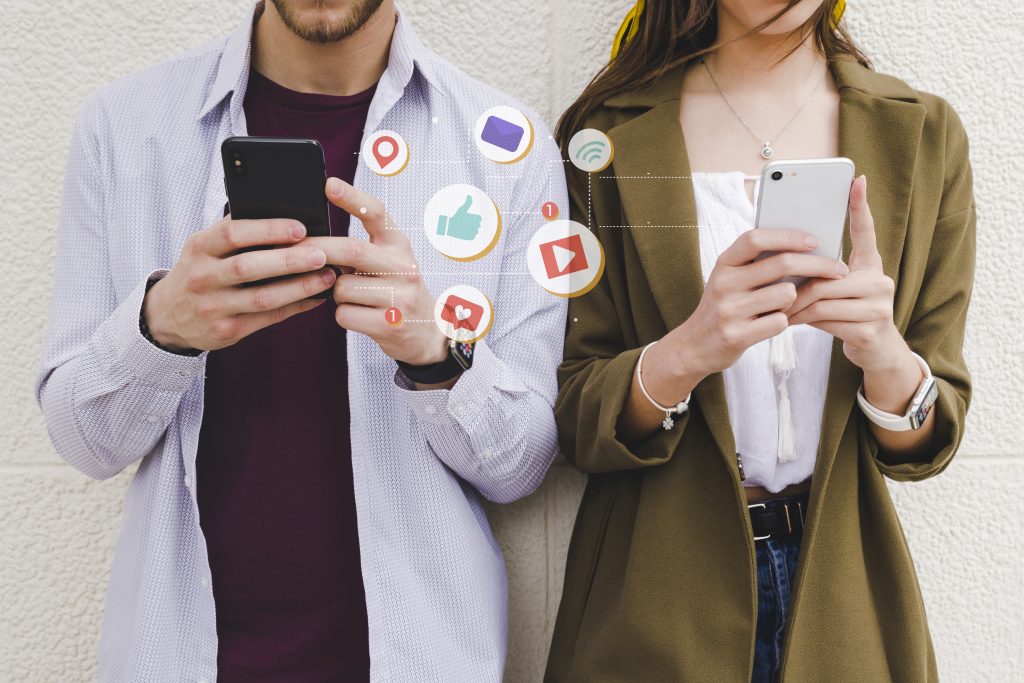
Image by Freepik (Freepik (n.d.). Mobile notification icons between man and woman. Retrieved from https://www.freepik.com/free-photo/mobile-notification-icons-man-woman-using-cell-phone_2611196.htm)
Social media has its merits: enabling global connections, providing information, and offering free entertainment. However, there’s a downside, especially for teenagers’ mental well-being.
Influencers often heavily edit their photos which sets unrealistic beauty standards. This can trigger body dysmorphia and eating disorders in impressionable teens who may not realize the extent of these edits. Unrealistic portrayals of idealized lives can lead to unhealthy comparisons, affecting teens’ self-esteem. Cyberbullying on social media can be more severe than face-to-face bullying due to anonymity. A 2019 study in the United States on teens aged 12-15 who spent three hours on social media showed an increased risk of mental health problems (The Lancet, 2019). Another study in 2016 with 450 participants using social media at night as an emotional investment linked to disturbed sleep and higher risks of anxiety and depression (Mayo Clinic, 2022).
Cyberbullying is defined as targeted online threats and harassment. This includes: aggressive and/or mean comments on a person’s post, nasty texts, pictures or videos being posted to intentionally embarrass another person, and posting peoples’ personal information online without consent (Kids Health, 2022). It is estimated that 37% of adolescents from ages 12 to 17 are being cyberbullied. About 60% of all young people will have witnessed cyberbullying in their life. Only 1 in ten teens will inform a trusted adult about the negativity that they are facing online (Do Something, n.d.) There are many devastating effects of cyberbullying for teens, such as self-harm, suicidal ideation, behavioural changes, use of drugs and alcohol, isolation, and avoiding using phones (Kaspersky, 2023).
Social media has also increased child exploitation through the rise of reality shows, YouTube family channels, and Instagram accounts. A lot of parents throughout the world post their children on social media for money; this is seen a lot through family channels on YouTube in which parents post a child’s vulnerable moments for millions to see. These can include when a child gets sick, hurt, in moments of distress or sadness, and many more embarrassing moments that should be kept private but are being posted online without the child’s consent. One can even argue that these parents are cyberbulling their own kids. This opens the door for hateful comments and for dangerous people to find out information about the school and home address of the kids. Many children that grew up online are now speaking up about how their childhood has impacted their mental health. It is possible that children growing up in this environment may have an increased chance of getting into drugs, alcohol, and a lack of education due to the negative effects of prolonged online usage — especially at a young age.
As social media becomes more popular, there has been a rise in body dysmorphia cases. While it is not only due to social media, it can be a contributing factor. Body dysmorphia can lead to eating disorders such as anorexia, orthorexia, and bulimia. These eating disorders can be a lifelong struggle, and it is amongst one of the biggest causes of death worldwide (HealthNews, 2022). It is no secret that influencers post a lot of highly edited images. Influencers can undergo plastic surgery procedures and not disclose to followers, and only post highly posed photos — both contribute to unrealistic beauty standards. While some teens are aware of the fact that a lot of influencers do edit their photos, a lot of the younger teens may not be aware, and even those that are can still struggle with their body image. Around 54% of female adolescents and 47% of male adolescents aged 16 to 18 struggle with body dissatisfaction. A study with male and female undergraduate students aged 17 to 25 found that when students had to reduce their social media use by 50%, most of the students had found a significate improvement in their confidence and body image (HealthNews, 2022).
While eliminating social media may not be feasible, setting limits on usage is crucial. Designate times for social media-free activities, prevent it from dominating important aspects of your life, and use it for meaningful connections rather than mindless scrolling. Unfollow accounts that induce negativity and create a positive space on your feed focused on hobbies, activism, or DIY projects. Take temporary breaks from social media when needed. If you are faced with cyberbullying, tell a parent or a trusted adult, keep evidence of the bullying, and block and report that person on the particular app that you’re using (SANE, 2022).
Note: The Free Your Mind Mental Health Society is an independent youth-led organization. The contents of this blog are not intended to be a substitute for professional medical advice, diagnosis, or treatment. Always seek the advice of your physician or another qualified health provider with any questions you may have regarding a medical condition. In the event of a medical emergency, please call your doctor or 911 or other local emergency numbers immediately.
References
Ben-Joseph, E. P. (2022, August). Cyberbullying (for teens). KidsHealth. https://kidshealth.org/en/teens/cyberbullying.html#:~:text=Cyberbullying%20is%20the%20use%20of,hurt%20or%20embarrass%20someone%20else.
Do Something. (n.d.).11 facts about cyberbullying. https://www.dosomething.org/us/facts/11-facts-about-cyber-bullying#:~:text=About%2037%25%20of%20young%20people,it%20happen%20more%20than%20once.
HealthNews. (n.d.). Does social media cause body dysmorphia? https://healthnews.com/news/social-media-may-play-a-role-in-body-dysmorphia/
Kapersky. (2023, December 12). What are the effects of cyberbullying? https://www.kaspersky.com/resource-center/preemptive-safety/cyberbullying-effects
Mayo Foundation for Medical Education and Research. (2022, February 26). How to help your teen navigate social media. Mayo Clinic. https://www.mayoclinic.org/healthy-lifestyle/tween-and-teen-health/in-depth/teens-and-social-media-use/art-20474437
SANE. (2022, February 8). Stop social media negatively impacting your mental health: Four simple tips! https://www.sane.org/information-and-resources/the-sane-blog/wellbeing/stop-social-media-negatively-impacting-your-mental-health#
The Lancet (2019, October). Roles of cyberbullying, sleep, and physical activity in mediating the effects of social media use on mental health and wellbeing among young people in England: a secondary analysis of longitudinal data. doi:10.1016/S2352-4642(19)30186-5.



